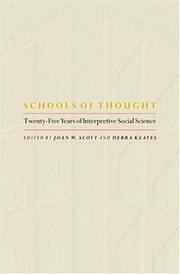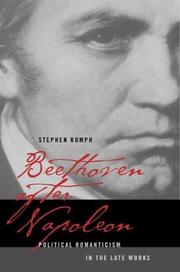| Listing 1 - 2 of 2 |
Sort by
|

ISBN: 069108842X 0691228388 0691088411 Year: 2001 Publisher: Princeton (N.J.): Princeton university press
Abstract | Keywords | Export | Availability | Bookmark
 Loading...
Loading...Choose an application
- Reference Manager
- EndNote
- RefWorks (Direct export to RefWorks)
This collection of essays stems from a 1997 conference celebrating the 25th anniversary of the Institute for Advanced Study's School of Social Science. Essays focus on disciplinary and methodology changes, institutional history, and the link between poltical philosophy and world governance.
#SBIB:3 G --- #SBIB:022.TOND --- Sociale Wetenschappen: algemeen --- Social sciences --- SOCIAL SCIENCE / General. --- Alchemy. --- Annales. --- Beyond Good and Evil. --- Circulation. --- Conflations. --- Das Kapital. --- Definitional Struggles. --- Futurism. --- Globalization. --- Harvard Theological Review. --- Orientalism. --- Poetry. --- Scale Making. --- Sunset Magazine. --- The German Ideology. --- The Phenomenology. --- absence. --- analytically. --- annus mirabilis. --- anthropology. --- conatus. --- creative nonfiction. --- discontinuity. --- exogenous. --- explicit. --- historicizes interpretation. --- humanity. --- identity. --- ideologies. --- implication. --- increasing returns. --- ingredient. --- interdisciplinarity. --- mentalités. --- motherhood. --- penetration. --- philosophy. --- reality effect. --- reductionist. --- referential illusion. --- situate. --- testimonio. --- transformation. --- Social Sciences --- Social sciences. --- Behavioral sciences --- Human sciences --- Sciences, Social --- Social science --- Social studies --- Civilization --- congresses --- Congresses.

ISBN: 1282759221 9786612759222 0520930126 1597344842 9780520930124 0520238559 9780520238558 9781597344845 1417545321 9781417545322 9781282759220 6612759224 Year: 2004 Publisher: Berkeley University of California Press
Abstract | Keywords | Export | Availability | Bookmark
 Loading...
Loading...Choose an application
- Reference Manager
- EndNote
- RefWorks (Direct export to RefWorks)
In this provocative analysis of Beethoven's late style, Stephen Rumph demonstrates how deeply political events shaped the composer's music, from his early enthusiasm for the French Revolution to his later entrenchment during the Napoleonic era. Impressive in its breadth of research as well as for its devotion to interdisciplinary work in music history, Beethoven after Napoleon challenges accepted views by illustrating the influence of German Romantic political thought in the formation of the artist's mature style. Beethoven's political views, Rumph argues, were not quite as liberal as many have assumed. While scholars agree that the works of the Napoleonic era such as the Eroica Symphony or Fidelio embody enlightened, revolutionary ideals of progress, freedom, and humanism, Beethoven's later works have attracted less political commentary. Rumph contends that the later works show clear affinities with a native German ideology that exalted history, religion, and the organic totality of state and society. He claims that as the Napoleonic Wars plunged Europe into political and economic turmoil, Beethoven's growing antipathy to the French mirrored the experience of his Romantic contemporaries. Rumph maintains that Beethoven's turn inward is no pessimistic retreat but a positive affirmation of new conservative ideals.
Romanticism in music. --- Musical romanticism --- Romanticism (Music) --- Style, Musical --- Neoromanticism (Music) --- Beethoven, Ludwig van, --- Bītʹhūfin, --- Beethoven, L. van --- Beethoven, Louis van, --- Beethoven, Ludvig van, --- Bethovenas, L., --- Betkhoven, Li︠u︡dvig van, --- Beṭhoṿn, Ludṿig ṿan, --- Beethoven, Ludwik van, --- Betkhoven, L. van --- Bētōven, Rūtovihhi van, --- בטהובן --- בעטהאָוון, לודוויג וואן --- ベートベン, ルートビッヒ, --- 贝多芬, --- Criticism and interpretation. --- Europe --- History --- academic. --- beethoven. --- biographical. --- classical music. --- composer. --- conservative. --- economics. --- famous composer. --- freedom. --- french revolution. --- german composer. --- german ideology. --- german music. --- german musician. --- humanism. --- interdisciplinary. --- liberal. --- music history. --- musical composer. --- musical composition. --- napoleon. --- napoleonic. --- native german. --- native people. --- political commentary. --- political. --- politics. --- progress. --- religious studies. --- revolution. --- revolutionary. --- romantic. --- scholarly.
| Listing 1 - 2 of 2 |
Sort by
|

 Search
Search Feedback
Feedback About UniCat
About UniCat  Help
Help News
News